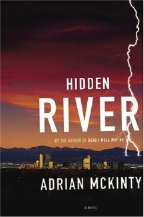 |
 Adrian McKinty
Adrian McKinty
Hidden River
Reviewed by: Terry D'Auray © 2005
Scribner/Simon & Schuster
US Hardcover First
ISBN: 0-7432-4700-0
288 Pages; $24.00
Publication Date: January 2005
Date Reviewed: February 23, 2005
Index:
Mystery
General Fiction
McKinty's debut novel 'Dead I Well May Be' was justly heaped with praise for its dark and violent action delivered in lyrical, Irish prose. His second book, 'Hidden River', while altogether different in circumstance, is equally dark, equally violent and equally praise-worthy. McKinty doesn't write the same story twice, but whatever his story, he threads it with consistent themes and peoples it with a uniquely engaging protagonist and well-developed supporting characters. Above all, he writes with mesmerizing and forceful language that ranks near the top of the noir genre, be it Irish or American.
'Hidden River' is the story of Alexander Lawson, a super-star Irish cop assigned to the drug squad who resigns in disgrace once his addiction to heroin is discovered. When his first love, the exotic Victoria Patawasti, is murdered in Denver, Colorado, Alex is hired by her father to investigate. It's Alex's opportunity to break his downward spiral, go to America, clean up and make a bit of money in the process. But McKinty's characters have a way of seizing opportunity and turning it upside down. Although they try to push the "up" button, they always end up heading "down", and Alex is true to form. From Belfast to Denver to India, 'Hidden River' narrates this hero's long, strange trip from transgression to redemption.
McKinty mixes his pivotal murder with liberal doses of religion, philosophy, environmentalism and politics, then shrouds it all within a cloud of heroin. 'Hidden River' tells two stories. The first is of Alex's investigation of Victoria's murder, which brings him to Denver and immerses him in a right-wing conservation group headed by Charles Muholland, a paper-thin preppy politician with grand ambitions and his beautiful but deadly wife Amber. McKinty's antiheros seem to gravitate toward women they should steer well clear of; and they pay a price far greater than seems fair for their lapse. The second story, initiated early in the book but not fully revisited until the very end, concerns the start of Alex's heroin addiction and his ouster from the Irish police force. Of the two, the second story is the more compelling with its multi-layered politics and deadly, coldhearted corruption. Heroin is pivotal to both stories -- in the first, it seduces Alex into danger and near death. In the second, heroin is Alex's dark but brilliantly clever savior.
McKinty's prose exhibits an expansive range. He creates harsh and explosive scenes of violent action, followed by lyrical, poetic moments of introspection, interspersed with sharp, staccato stream-of-conscious impressions. He transitions deftly from one to the next to the next with sure-handed control and perfectly-tuned pacing, leaving readers to turn the pages while wiping their tears. Whether hard-edged or soft, McKinty's language is always honest, always forceful, and often subtly humorous, delivering quality thrills and impactful poignancy with equal power. As he did in 'Dead I Well May Be', McKinty foreshadows future events with grave, but unheeded, warnings. While the reader, knowing nothing but bad things lie ahead, wants to shout "Stop", the inevitable downward spiral is all the more grim for being foretold.
In 'Hidden River', McKinty traces Alex's path from sin to atonement to redemption. Alex is a complex man and his path is a convoluted and wayward one, littered with conflict, splattered with blood, but it's a path no reader who revels in pitch-perfect language would want to miss.
|
 |
